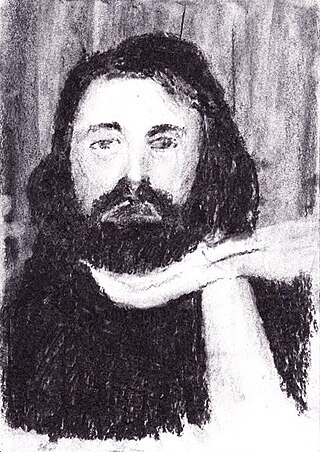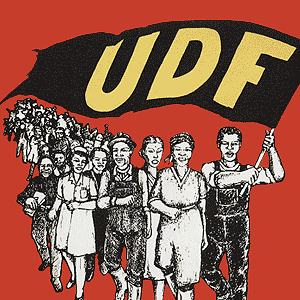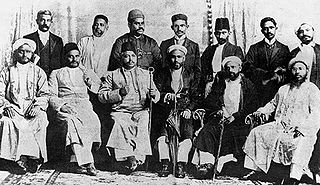Related Research Articles

Neil Aggett was a doctor and trade union organiser who was killed, while in detention, by the Security Branch of the Apartheid South African Police Service after being held for 70 days without trial.
Fholisani Sydney Mufamadi is a South African politician. He was Minister of Safety and Security from 1994 to 1999 and Minister of Provincial and Local Government from 1999 to 2008.
The Treason Trial was a trial in Johannesburg in which 156 people, including Nelson Mandela, were arrested in a raid and accused of treason in South Africa in 1956.

The United Democratic Front (UDF) was a South African popular front that existed from 1983 to 1991. The UDF comprised more than 400 public organizations including trade unions, students' unions, women's and parachurch organizations. The UDF's goal was to establish a "non-racial, united South Africa in which segregation is abolished and in which society is freed from institutional and systematic racism." Its slogan was "UDF Unites, Apartheid Divides." The Front was established in 1983 to oppose the introduction of the Tricameral Parliament by the white-dominated National Party government, and dissolved in 1991 during the early stages of the transition to democracy.

The Natal Indian Congress (NIC) was a political organisation established in 1894 to fight discrimination against Indians in the Natal Colony, and later the Natal Province, of South Africa. Founded by Mahatma Gandhi, it later served an important role in opposing apartheid. It was the oldest affiliate of the South African Indian Congress.
Vuyisile Mini was a unionist, Umkhonto we Sizwe activist, singer and one of the first African National Congress members to be executed by apartheid South Africa.
The Johannesburg Central Police Station is a South African Police Service police station in downtown Johannesburg, South Africa. From its unveiling in 1968 until September 1997, it was called John Vorster Square, after Prime Minister B.J. Vorster.
John Kgwana Nkadimeng was a South African politician, anti-apartheid activist and South African ambassador in Cuba. Nkadimeng was awarded the Order of Luthuli in 2003 by President Thabo Mbeki and Isitwalandwe in 2019 by President Cyril Ramaphosa.

The Security Branch of the South African Police, established in 1947 as the Special Branch, was the security police apparatus of the apartheid state in South Africa. From the 1960s to the 1980s, it was one of the three main state entities responsible for intelligence gathering, the others being the Bureau for State Security and the Military Intelligence division of the South African Defence Force. In 1987, at its peak, the Security Branch accounted for only thirteen percent of police personnel, but it wielded great influence as the "elite" service of the police.
Max Coleman was a South African activist and former businessman. He represented the African National Congress (ANC) in the National Assembly from 1994 to 1995 and then served in the South African Human Rights Commission from 1995 to 1996. During apartheid, Coleman was a founding member of the Detainees' Parents' Support Committee, a civil society organisation, after his son was detained for his political activities. Coleman subsequently sold his business in order to organise on the committee's behalf full time.
Bavumile Herbert Vilakazi was a South African politician, diplomat and former anti-apartheid activist who was the inaugural Mayor of Ekurhuleni from 2000 to 2001. Before that, he represented the African National Congress (ANC) in the National Assembly from 1994 to 2000.
Aubrey Dundubela Mokoena was a South African politician and former anti-apartheid activist. He represented the African National Congress (ANC) in the National Assembly from 1994 to 2014, excepting a brief hiatus in 2009. He served the Gauteng constituency and chaired the Portfolio Committee on Home Affairs from 1999 to 2002.
The Pietermaritzburg Treason Trial was heard in the Supreme Court of South Africa from 21 October 1985 to 23 June 1986. In the largest political trial since the Rivonia Trial, the apartheid state pursued charges of high treason against 16 leaders of the United Democratic Front (UDF) and four affiliated organisations. State v Ramgobin and Others was generally regarded as a failure in both legal and political terms: the charges against 12 defendants were dropped in December 1985 and the remaining four were freed in June 1986, while the South African state received international criticism for having instituted the charges in the first place.
Ratshivhanda Samson Ndou is a South African politician and former trade unionist. During apartheid, he was a prominent member of a network of Charterist union organisers in the Transvaal, as well as a founding member of the United Democratic Front (UDF) and president of the General and Allied Workers' Union (GAWU).
Ismail Jacobus Mohamed was a South African activist and mathematician. He represented the African National Congress (ANC) in the National Assembly from 1994 to 2009.
Mawalal "Mewa" Ramgobin was a South African politician and former anti-apartheid activist. A stalwart of the Natal Indian Congress, he represented the African National Congress (ANC) in the National Assembly from 1994 to 2009.
Andrew Frans Madella is a South African politician, disability rights activist, and former trade unionist. A member of the African National Congress (ANC), he served the Western Cape constituency in the National Assembly from 2005 to 2009 and from 2014 to 2019.
Muzivukile Curnick Ndlovu, also spelled Muzuvukile, was a South African politician, anti-apartheid activist, and trade unionist. A veteran of the African National Congress, he represented the party in the National Assembly during the first democratic Parliament from 1994 to 1999. He was also a former national chairperson of the United Democratic Front, a former secretary of the Railway and Harbour Workers' Union, and a former regional commander of Umkhonto we Sizwe (MK) in Natal Province.
Noel John Williams is a South African politician and former anti-apartheid activist from Cape Town. He is known for his community and labour activism in Atlantis, and he represented the African National Congress (ANC) in the National Assembly during the first democratic Parliament.
Peter Mampogoane Nchabeleng was a South African trade unionist and anti-apartheid activist who died in police detention in the Lebowa bantustan in April 1986. At the time of his death, he was the inaugural chairperson of the United Democratic Front in the Northern Transvaal and head of the underground African National Congress (ANC) in the same region.
References
- 1 2 "General Notice: Notice 717 of 2004 - Electoral Commission – List of Names of Representatives in the National Assembly and the Nine Provincial Legislatures in Respect of the Elections Held on 14 April 2004" (PDF). Government Gazette of South Africa . Vol. 466, no. 2677. Pretoria, South Africa: Government of South Africa. 20 April 2004. pp. 4–95. Retrieved 26 March 2021.
- 1 2 Lodge, Tom; Nasson, Bill (1991). All, Here, and Now: Black Politics in South Africa in the 1980s. Ford Foundation. p. 43. ISBN 978-0-86486-213-6.
- ↑ MacShane, Denis; Plaut, Martin; Ward, David (1984). Power!: Black Workers, Their Unions and the Struggle for Freedom in South Africa. South End Press. p. 46. ISBN 978-0-89608-244-1.
- ↑ Welsh, David (22 November 2010). The Rise And Fall Of Apartheid: From Racial Domination To Majority Rule. Jonathan Ball. ISBN 978-1-86842-410-8.
- ↑ Barchiesi, Franco (1 June 2011). Precarious Liberation: Workers, the State, and Contested Social Citizenship in Postapartheid South Africa. State University of New York Press. p. 53. ISBN 978-1-4384-3612-8.
- ↑ South African Democracy Education Trust (2004). The Road to Democracy in South Africa: 1970-1980. Unisa Press. ISBN 978-1-86888-406-3.
- ↑ Seekings, Jeremy (2000). The UDF: A History of the United Democratic Front in South Africa, 1983-1991. New Africa Books. p. 38. ISBN 978-0-86486-403-1.
- 1 2 Sparks, Allister (27 November 1982). "South African Moves Against Labor Activists Fizzle". Washington Post. ISSN 0190-8286 . Retrieved 13 June 2023.
- 1 2 "Aggett inquest told of electrocution and suffocation". New Frame. 6 February 2020. Retrieved 13 June 2023.
- ↑ "Neil Aggett Inquest: Fellow inmate reveals key info he withheld during first probe". eNCA. 5 February 2020. Retrieved 13 June 2023.
- ↑ "South Africa Clears 12 of Treason: Charges Against Most Prominent Foes of Apartheid Dropped". Los Angeles Times. 9 December 1985. Retrieved 29 April 2023.
- ↑ Gargan, Edward A. (24 June 1986). "South Africa treason trial ends with acquittal of 4". The New York Times. ISSN 0362-4331 . Retrieved 29 April 2023.
- ↑ Frankel, Glenn (24 June 1986). "South Africa Halts Trial". Washington Post. ISSN 0190-8286 . Retrieved 29 April 2023.
- ↑ "Hospital strike ends with rights for union". The Mail & Guardian. 10 May 1990. Retrieved 13 June 2023.
- 1 2 "Sisa Njikelana". Energy Storage Africa. 26 October 2020. Retrieved 13 June 2023.
- 1 2 "Nominations of MPs to constitutional bodies and international institutions". ANC Parliamentary Caucus. 26 May 2009. Retrieved 13 June 2023.
- 1 2 "Sisa James Njikelana". People's Assembly. Retrieved 13 June 2023.